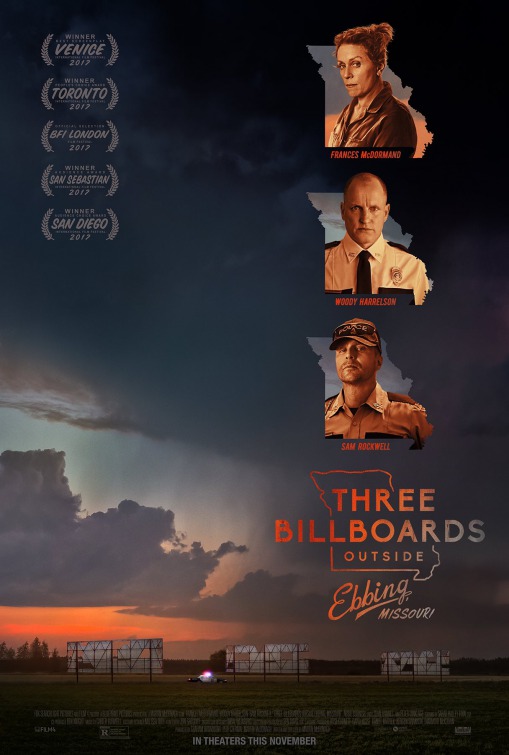Some People Just Can’t Read The Signs
Director
Martin McDonagh
Starring
Frances McDormand
Sam Rockwell
Woody Harrelson
Caleb Landry Jones
In the small town of Ebbing, Missouri, Mildred Hayes [McDormand] has suffered the loss of her young daughter who was raped, murdered and burnt. Months have passed with no luck from the local law enforcement, so she decides to take matters into her own hands and pays to have posters erected on three neglected billboards on a largely unused road. The posters are very simplistic in their message and call out the Chief of Police Bill Willoughby [Harrelson] for his lack of progress. This stubborn refusal to let the matter go and continually shame the police department continues and escalates while the town is swayed back and forth between with whom to side.
As a huge fan of McDonagh’s work (both brothers for that matter) I was bitterly disappointed by Martin McDonagh’s previous release, Seven Psychopaths. It was far from poorly crafted, it merely suffered from a chaotic, meandering plot and lack of clear vision; like the jumbled drunken nightmares of a pensive writer. Three Billboards Outside Ebbing, Missouri not only rectifies that, it improves on the extremely enjoyable theatrical-feeling In Bruges and is quite easily Martin McDonagh’s most narratively focused cinematic work. It wastes no time getting the story going and characters established then unfolds and escalates magnificently while maintaining its gripping pacing. In truth, the whole thing is very reminiscent of a very sweary Coen brothers feature. A fact enhanced by the mournful score that hangs tensely, reminding me of Carter Burwell’s work. Only for me to discover, as the credits rolled, that it was Burwell who scored the film.
Staying with the Coen comparison for a second, a key element to this film’s success is an incredibly strong script being brought to life by absolutely spectacular central performances. Since the mid-90s it’s been apparent that Frances McDormand is an exceptional talent, able to switch between comedic and dramatic tones with grace and ease, without betraying the character. Her role as Mildred Hayes is a great example of this, vengeful, driven, committed, uncompromising and resolute but also completely fragile and tender at times. What’s more, she’s not a caricature; she is more complex than a ranting unstoppable monster. This is best reflected by the fact that her fiery rage is halted in its tracks when she confronts people at their weakest. From her ex-husband, to the rash Dixon, to the Chief and his wife – when she realises that someone is hurting to the degree that it doesn’t bring her closer to identifying her daughter’s killer, compassion kicks in and she deals with the individual at hand humanely. It’s this relatability that reminds us that this woman is in immense pain and trying to resolve the problem, which is why the film’s closing line of dialogue is absolutely perfect – but obviously I can’t discuss that at length yet.
In addition to McDormand’s powerful lead performance, the supporting cast are wonderful. The film clearly addresses a lot of contemporary social concerns from lack of faith in policing, the generational evolution of the Southern States, the way investigations are treated when they are in the public eye, public opinion/bias fuelled by the media and victim blaming. But it’s much more complex than a town of simple backward individuals against a saintly figure, Mildred is flawed but the townsfolk are equally multiform in their capacity for good and bad. The focus of Mildred’s fury is the Chief of police, Bill Willoughby and initially he comes off as a well-meaning family man but Mildred makes valid points that more could be done if the proper motivation as applied. Willoughby complicates matters for the audience as he is dealing with his own plights, so we shift the villainous role to the impetuous Officer Jason Dixon who is rude, lazy, violent and racist. But as the film progresses, we start to understand why Dixon is the way he is and he then becomes a sympathetic character. This rolling search for a true villain is very much the embodiment of Mildred’s quest. We, the audience, are rooting for Mildred so are desperately seeking an opposing antagonistic force but as we learn that the characters presented are merely average people, we lash out to the next obvious target. Finally this absence hits its peak when we realise that we too are looking for closure, that we want Mildred or the police or someone to find the man responsible for all this grief, pain and madness and to bring him to justice – arguably by any means – but this may be an absolute impossibility. And the key take away from this whole observation is that without a clear villain the absurdity of revenge is revealed, that no present action can change the past but for more on that thread, see my highlighted scene below.
**this paragraph is one big spoiler from start to finish**
Earlier I mentioned the ability for Mildred to ease off when people are at their weakest and that the characters introduced are more layered than simply good and bad. This rotational alignment is summed up rather neatly by a visiting priest who says “The town were behind you when Angela died, they’re not behind you on this.” It’s also very interestingly addressed with the man Dixon fingers for Angela’s murder. For those who have seen the film, Dixon is fired from his job by his new commanding officer and suffers humiliation and defeat as well as physical harm. He regains the audience’s respect by overhearing an individual in a bar boasting about committing a crime that matches the details of Angela’s death. In his own way, he gets into a fight and collects a DNA sample from the individual to be cross-referenced against the DNA found on Angela’s corpse. From a point of narrative closure, we feel like justice is ready to be delivered and the story can be neatly wrapped up. Especially as the man responsible also intimidated Mildred earlier in the film. Yet, with complete frankness, the new Chief explains that the man has a perfect alibi. The characters reject it, the audience reject it and we’re back to square one. What initially feels convenient but necessary to serve a redemptive arc is suddenly taken from us but sets up the absolute perfect crushing finale. Dixon relays to Mildred that the man he found wasn’t responsible but he’s responsible for something and they can both take out their frustrations on him, safe in the knowledge that “he had it coming.” Thus they pack up their car and head to his home address. Before the film closes, both characters express that they aren’t sure about killing the man but they’ll make their mind up on the way. This is the most fitting ending one could expect. Any climactic showdown would bring us no satisfaction and serve only to drag the story to a middling conclusion. The added complication of the fact this man is in the army adds another layer of possible complication; maybe he’s guilty, maybe he isn’t, maybe he’s just boasting, maybe he acts out as PTSD from military service. We can’t know for certain therefore the characters can’t know for certain. As a moral conundrum it’s wonderful and in typical McDonagh fashion the story doesn’t end, we just collectively stop paying attention.
The thing that pleases me the most about these releases are the strong morally complex characters, absence of simple conclusions and hilarious predicaments with an incredibly moving undertone. And with every passing feature McDonagh gets better and better, from the direction, the writing, editing and even down to the people he chooses to work with again and again. As such, I eagerly look forward to his next release, as should we all.
Release Date:
12th January 2018
The Scene To Look Out For:
I mentioned the absurdity of revenge and how little it resolves, the turning point for Mildred, when she starts to get an inkling that there’s a possibility that all of this is in vain, is in the form of a flashback. Her son, furious with her, reveals that he wasn’t aware of the full details of his sister’s death, that he couldn’t bring himself to read the police report but Mildred’s posters lay it out in a twenty foot font. Mildred then sits in her late daughter’s room and we see a very amusing and honest family scene where mother and daughter fight over a simple triviality like borrowing a car. This leads to a tense exchange resulting in Angela screaming, “I will walk and you know what, I hope I get raped on the way home!” to which Mildred furiously barks back, “I hope you get raped too!” We then cut to the cold empty room and the excruciating regret that hangs over the audience could not be any more real or palpable.
Notable Characters:
Just for his arc alone, I love Sam Rockwell’s character. It takes an actor of extreme ability to drive you to hate someone, then elevate that to slight sympathy before eventually arriving at genuine support.
Highlighted Quote:
“If you get rid of all the cops with vaguely racist leanings you’ll have.. three cops left. Who’ll hate all the fags. So what are you gonna do?”
In A Few Words:
“Another masterful release from McDonagh rife with his trademark wit, humour and emotional poignance”
Total Score: 5/5
![The Red Right Hand Movie Reviews [Matthew Stogdon]](https://reviews.theredrighthand.co.uk/wp-content/uploads/2021/12/cropped-header1.png)




